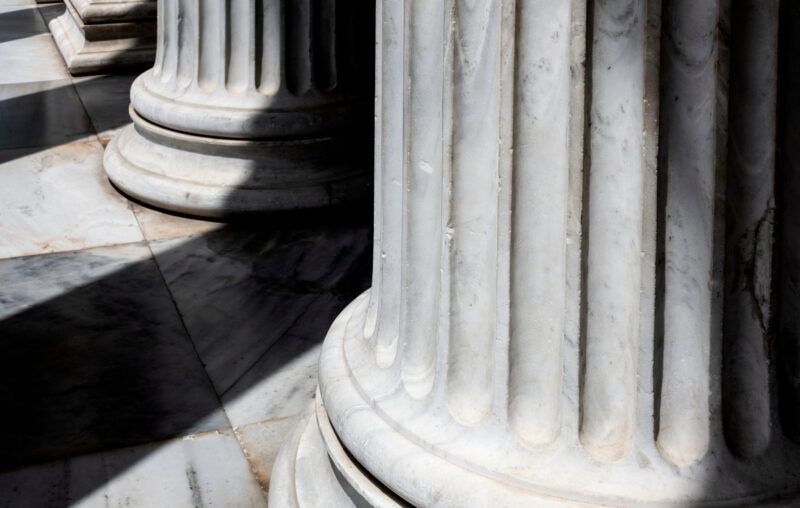Reprinted from Bryan Caplan’s Bet On It
A blog post by Bryan Caplan begins:
I’ve long been puzzled by libertarian reverence for ‘the rule of law.’ Why should friends of freedom care about the laws passed by the foolish and evil people who habitually rule over us? We should instead stubbornly put justice before the law.
I am a colleague and friend to him and refer to him by his first name.
Bryan shows reverence for ‘justice’ and ‘freedom’ but not ‘the rule of law.’ He also shows no reverence for ‘law,’ which Bryan seems to flatten down to government law. Would Bryan regard that sacred justice or freedom, to which he has dedicated much of his life, as a sort of law?
Bryan expresses his own personal attitude toward government laws:
What’s the alternative [to dutifully following such laws]? Being a righteous scofflaw. Follow just laws. Break unjust laws when the expected gains are positive.
I agree with some of Bryan’s points. Most importantly, Bryan encourages an exercise of conscience and discretion in the face of unjust laws. Unjust laws should not necessarily be followed. Don’t be a heel-clicker. Also, I agree with Bryan that Martin Luther King’s maxim not to evade enforcement of government laws we break is facile; King’s pronouncement should not be taken too seriously. Also, the David Henry Thoreau quotation is good, as far as it goes.
But Bryan’s opening remark—”I’ve long been puzzled by libertarian reverence for ‘the rule of law’”— is jarring in its irreverence. A big problem with Bryan’s post is that it makes law-following by citizens the central feature of the rule of law. Many of the commenters at the post rightly object. Many indicate what is more central to the concept of the rule of law.
The rule of law is something to honor, cherish, and elevate.
What is the rule of law? I don’t attempt a definition but offer some hints.
The concept of the rule of law presupposes something like a polity with more than a semblance of jural integration and functionality. The supposition of jural integration means that we can speak of ‘the government’ of ‘the polity,’ even if that polity, like the United States, involves an array of governments, like federal, state, and local. The presupposition of jural integration fits the concept of the modern nation-state. I note the presupposition because we don’t want to apply the rule-of-law concept where it does not belong.
The rule-of-law concept involves the following three objects:
- the body of the laws that the government officializes and posts on its website, as it were;
- the government’s effectuating of—or administering of—that body of law, which involves:
i. the posting of it on the website,
ii. the enforcement of each law’s precept,
the procedures, application, and execution of the sanctions; - the conduct and attitudes of the subjects of the law.
Bryan’s focus is law-following by citizens. That is part of the third object, the conduct of citizens. But, the most central object of the rule-of-law concept is the effectuation.
Why do we expound on and extol the rule of law? Factions abuse the effectuation of law. They work things to gain and maintain power. They weaponize. They also abuse to enrich themselves, and to basely elevate themselves. A primary concern of the rule of law is the prevention of weaponization, bullying, double-standards, show trials, corruption, lying, cheating, election stealing, leaking information, stonewalling, deceit, conspiring, juntaism, and so on. The rule of law is about combatting abuse of powers that attend the making and effectuation of the law.
Factions are not equally vicious. Abusiveness tends to match the type of laws favored: Illiberality and anti-liberalism go together, while liberality and liberalism go together. Virtuous politics is wise deliberation concerning the perennial political dilemma: The existence of public authority and the mitigation of its tremendous evils. “The fatal effects of bad government arise from nothing, but that it does not sufficiently guard against the mischiefs which human wickedness gives occasion to” (link).
Above, in speaking of effectuation, I use an old jurisprudential distinction between a law’s precept and its sanction (a distinction found in Pufendorf, Carmichael, and Hutcheson). A law says, “Don’t—Or Else!” The precept is the “Don’t” and the sanction is the “or Else.” Note that after a breach of the precept, the sanction involves a precept for the sanctioner, and that precept in turn suggests the sanctioning of the first-order sanctioner who failed in his duty to apply the first-order sanction. Thus, the distinction recurs, giving rise to a spiral.
If you think the deeper loops of this spiral are well defined, think again. It’s a scary thought, in our world of weaponizers. That’s one reason why the concept of the rule of law is important.
Again, effectuation of law is the most central object of the rule-of-law concept. Next would be the first object listed above, the body of law itself. Thus, what Bryan focuses on is part of the object that comes last in centrality, the conduct of the subjects of the law.
The rule-of-law concept is about the doings of government players, and only secondarily about whether citizens or subjects follow the law. Depravities in the body of law tend to breed both depredations in effectuation and law-breaking by subjects. So, although law-following is not primary in the rule-of-law concept, it relates to the things that are primary.
I like the old notion that a law is a rule laid down by a superior. What is a superior? One sort of superior is a jural superior, that is, the government in its lawmaking capacity (as opposed to its ownership capacity, i.e., public-sector resources and public administration). The government is a very special player. What other agent institutionalizes its coercions, posts them on a website, carries them out openly, and publicly pretends that the coercions are good for the whole? The term ‘superior’ for this kind of player has a long tradition (see Diesel, Adam Smith Review), and is worth embracing. We thusly regard the rules posted at the government website as law. The term legal signifies government rules with the status of law.
The government is not the only sort of superior, however. Theists call God’s rules ‘laws.’ And nontheists, such as myself (an agnostic), may, in parallel fashion, call rules that are approved of by a worthy allegorical being, superior to any human being, ‘law’:
[T]hey are rules to direct the free actions of men: they are prescribed most surely by a lawful superior, and are attended too with the sanction of rewards and punishments. Those vicegerents of God within us never fail to punish the violation of them by the torments of inward shame and self-condemnation; and, on the contrary, always reward obedience with tranquility of mind, with contentment, and self-satisfaction. (link)
If you go against the precept of one of the superior’s laws, the superior and his vicegerents disapprove of your conduct, and, for the inspirited person, that disapproval functions as a sort of sanction. The spirit’s rules are reasonably fashioned ‘natural law.’ The justice that wins Bryan’s allegiance, too, may be thusly regarded as law on the same grounds—again, rule laid down by a superior.
Generally speaking, in a country like the United States, for the ordinary citizen, a government law ought to bring with it a certain authority. The mere fact of legality ought to lead one, when consulting the scales, to add something in obligation, beyond common prudence, to following the law. Adam Smith would agree with that (e.g., TMS, 81.8). Bryan’s post seems to disagree. Compare with Edmund Burke:
The people are not to be taught to think lightly of their engagements to their governors; else they teach governors to think lightly of their engagements towards them. In that kind of game in the end the people are sure to be losers. (link)
Existence without the rule of law is dystopic. The rule of law gives warrant to liberalism. We should better learn to expound on how liberalism promotes the rule of law and how the governmentalization of social affairs tends to destroy the rule of law. We should better learn to expound on how governmentalization sucks.
‘The rule of law’ is a venerable expression for a worthy, if fuzzy, concept. Let us venerate the tradition that made Bryan possible:
- “You shall not murder.
- “You shall not commit adultery.
- “You shall not steal.
- “You shall not bear false witness against your neighbor.
- “You shall not covet your neighbor’s house; you shall not covet your neighbor’s wife, nor his male servant, nor his female servant, nor his ox, nor his donkey, nor anything that is your neighbor’s.”




